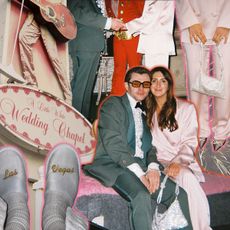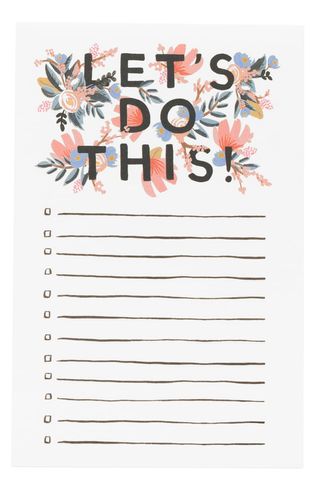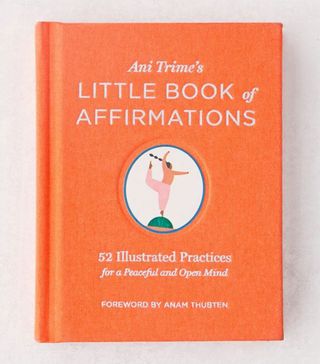6 Things Empowered Women Never Say

There has been a lot of talk in recent years about how women should stop saying "sorry" or using words or phrases that might show weakness or deference. You might have seen graphics on Instagram, read a bunch of think pieces on the topic, or even talked about it with your friends or co-workers. Or maybe you even watched the sketch on Inside Amy Schumer in which the comedian really showcases just how much women say sorry, even in the most unlikely situations, that will make you cringe, laugh, and feel guilty about your own tendencies all at once.
I'm one of those women who revert to "sorry" a lot, and I consider myself a feminist, champion of other women, independent, you know, all that good women's empowerment stuff. I also can feel so sure of myself at times, but when it's time to speak my truth or my opinion, I'm guilty of adding phrases like "I feel" or "What do you think?" or "I'm not so sure." I can't shake those habits, and in turn I know I might appear to others as not confident, not powerful, and not sure of myself.

"Generally speaking, women have a nurturing personality, and that can make them come across as a softy," explains Talkspace therapist Cynthia Catchings, LCSW-S, CFTP, CMHIMP. "Some women use 'I'm sorry' too often to acknowledge wrong when there may not even be a transgression or when we want to make the other person feel better."
Catchings says other common and similar phrases include "I'll try," "I don't mean to bother you," "I wish I could," "Like," "I might be wrong about this," and "Does it make sense?"

Talking about why a lot of women tend to be apologetic or not as assertive or certain in their speech is a whole other story for another day. It involves years and years of ingrained gender and societal norms, and honestly, there are so many good essays, books, podcasts, TED Talks on the subject, so I won't get into that here. What I want to explore is how we can change our mindset and rephrase our words to feel more empowered and confident.
We've talked a lot about confidence recently, from using body language to convey it to looking at ways we can speak up for ourselves. Adapting and changing how we speak is another point you can focus on if you find yourself wanting to appear and feel more confident, assertive, and stand in your power.

Now, maybe you're reading this and thinking this doesn't apply to you at all. If so, good on you. And I'm not saying that we can't say sorry at all. There's a time and place for everything, right? And sometimes you actually do feel sorry or it was your mistake or you did something wrong. But for the other times when you use sorry or other unsure phrases as a reflex, I went to the experts for help and asked them for their tips on how to talk with more confidence and how to be more empowered to speak your truth.
Phrases or Words to Avoid

"Try to consider your verbiage and use strong rather than passive wording," suggests Madeleine DiLeonardo, MEd, LPC, NCC, a licensed professional counselor and the founder of Mind Body and Soul by DiLeonardo Wellness. "For example, saying things like, 'Please let me know when you have a minute' instead of 'So sorry to bother you.'"

Here's where "sorry" comes in again. The word seems to come out when you're presenting bad news, declining something, or even saying something you think might be perceived the wrong way or you're unsure of. "Women tend to be 'people pleasers' and therefore want to make sure that they please people or take care of other people's feelings," DiLeonardo explains. "Often, if we need to present bad news or say no to something, we apologize profusely or offer excuses. Instead of doing this, keep in mind that your time is your own, and you are allowed to make decisions that are best for you without excuses. If you can have confidence that what you're doing is what is best for you at this time, there is no need to overly apologize or provide an explanation."

It's okay to be self-deprecating at times, but sometimes it can go too far. You wouldn't want to belittle or disparage yourself. "When we are at work, we want to appear assertive, confident, and knowledgeable," Catchings says. "Avoid saying things that undermine you as a woman, as a professional, or as a human being."
This goes for when you're with your partner, friends, or family. Catchings says you should avoid using words or phrases that give the impression of you not loving yourself. "When messaging friends and family, slow down and skim your messages before you send, notice where the undermining qualifier shows up, and edit it out," she recommends.

This is something you'd want to steer clear of at work. "Try to avoid generalizations including things like, 'We have always done it this way' or 'This is really unfair' or 'That wasn't my fault,'" explains DiLeonardo. "Instead, understand that workplace dynamics are nuanced and be open to advocating for yourself while also avoiding complaining in a way that presents as if you are blaming others or not taking agency over your own work."

If I had to count how many times I say "I feel like" throughout the day, it might cap out at 20 or 30. That's a lot. And the phrase doesn't sound very strong or convincing. Instead, Catchings suggests using "think."

This goes for just about everyone—man or woman, young or old—but it's a good reminder that you don't have to put someone down to feel more powerful. "With partners or friends, we just want to be careful that we don't say something in the heat of the moment that can be hurtful or hit below the belt," DiLeonardo says. "Other than that, positive friendships and relationships should be spaces where we can express ourselves and work through challenges even if there are disagreements. The strongest relationships are not the ones where we don't face any conflict or adversity, but instead the ones we invest in in order to overcome this and strengthen the relationship further. It's also always great to try to be the kind of friend who empowers others as well as surround yourself with friends who empower you."
How to Rephrase or Change Your Mindset

There are some ways you can work to change up how you speak or present yourself. But it doesn't mean you have to do a complete 180. "Remind yourself that the goal is not to eliminate the word or phrase—that would be unrealistic," Catchings explains. "Instead, aim to notice when you hear or see yourself using it." Here are some tips to put into practice:

It helps to think positive, affirming thoughts. "You deserve to live a great life and to have positive things come to you," DiLeonardo says. "This means advocating for yourself and asking for what you want and need in order to continue to create this for yourself. I think women are also often afraid of rejection or disagreement. Try to reframe in your mind that the worst that can happen is that someone says no or disagrees with what you are saying and that you can handle this. There have been several times where you have experienced disagreements and been able to move forward, so be confident in going for what you want."

DiLeonardo says you want to do this instead of dancing around the point or rambling. It's time to be comfortable with pauses. "We often feel uncomfortable with silence and try to fill pauses with continued conversation, but getting more comfortable with pauses allows for you to both gather your thoughts so that you continue to speak succinctly and for your point to sink in," she explains.

Catchings says in order to stop utilitzing sorry and other similar phrases in favor of more assertive, confident language, you'll need to observe and be aware of how often you say those things. "An excellent way to identify our use of phrases like 'I'm sorry' is to do an email search using those words and then verifying if we used it correctly or because we were over-apologetic or concerned about not sounding kind and caring," she suggests. "Once we do that, we can start replacing those phrases we need to change with words of gratitude, respect, or encouragement."

Once you observe your habits, you can start to put a plan into action. Catchings says this plan includes how to remind yourself about the change, what words or phrases you will use as a substitution, and how this will change your perspective and awareness.

Like anything, it's going to take some practice to switch up your habits. Catchings suggests asking a friend or family member to practice conversations with you. You have to practice to appear more confident and assertive. She also recommends watching videos that teach you how to present yourself with confidence and to learn from your mistakes and be patient with yourself.

To get your point across, you want to strike the right tone and balance. "You have to keep in mind that striking this balance is going to take practice," Catchings says. "Be patient and remember that the important thing is that you commit to making your voice heard while being respectful of others."
One example Catchings gives is to picture yourself in an important meeting where a final recommendation is needed and everyone is giving different opinions. No one is saying anything significant, but you actually have a good idea. She says there are three ways you can speak up:
Weak: "I'm not sure how everyone else will about this, but I feel…" Catchings says the use of "not sure" and "I feel" weakens your statement.
Abrupt: "Here is what we are doing." She explains that this is very authoritative, not in a good way, and leaves people out.
Just right: "Hearing everyone's thoughts has been clarifying for me. Here is what I think we should do to move forward." Catchings says this is the right balance of being able to confidently voice your opinion while acknowledging others' input."
Next up: 28 of the Most Successful Women in Fashion and Beauty Share Their Confidence Tips
Disclaimer
This article is provided for informational purposes only and is not intended to be used in the place of advice of your physician or other medical professionals. You should always consult with your doctor or healthcare provider first with any health-related questions.
Sarah is lifestyle writer and editor with over 10 years of experience covering health and wellness, interior design, food, beauty, and tech. Born and raised in Los Angeles, she attended New York University and lived in New York for 12 years before returning to L.A. in 2019.
In addition to her work on THE/THIRTY and Who What Wear, she held editor roles at Apartment Therapy, Real Simple, House Beautiful, Elle Decor, and The Bump (sister site of The Knot).
She has a passion for health and wellness, but she especially loves writing about mental health. Her self-care routine consists of five things: a good workout, “me” time on the regular, an intriguing book/podcast/playlist to unwind after a long day, naps, and decorating her home.
-
 I'm a Fashion Editor Who Loves to Travel—30 Essentials I'm Packing This Year
I'm a Fashion Editor Who Loves to Travel—30 Essentials I'm Packing This YearSeriously good travel items ahead.
By Grace O'Connell Joshua
-
 My NYC Apartment Needs Some Serious Organizing, and These 30 Items Saved the Day
My NYC Apartment Needs Some Serious Organizing, and These 30 Items Saved the DayIt's time to do some cleaning.
By Grace O'Connell Joshua
-
 Calling All Fashion Brides: These Are the *It* Bridesmaid Dress Trends to Know
Calling All Fashion Brides: These Are the *It* Bridesmaid Dress Trends to KnowDon't worry. It's nothing like 27 Dresses.
By Yusra Siddiqui
-
 A Pink Suit, a Vintage Limo, and Plenty of Elvis: Inside My Vegas Vow Renewal
A Pink Suit, a Vintage Limo, and Plenty of Elvis: Inside My Vegas Vow RenewalThank you. Thank you very much.
By Caitie Schlisserman
-
 Making My Bedroom Look Peak Fashion Person Only Required These Easy Changes
Making My Bedroom Look Peak Fashion Person Only Required These Easy ChangesAn interior designer spilled some tea, and I took notes.
By Sierra Mayhew
-
 Sydney Sweeney Just Broke My #1 Airport Dressing Rule
Sydney Sweeney Just Broke My #1 Airport Dressing RuleIt's TSA approved, but still.
By Drew Elovitz
-
 We're Fashion Editors in NYC—We Basically Live at These 9 Hot Spots
We're Fashion Editors in NYC—We Basically Live at These 9 Hot SpotsWelcome to your stylish city guide.
By Anna LaPlaca
-
 You Have 48 Hours in Los Angeles—Here's Your Fashion Editor–Approved Itinerary
You Have 48 Hours in Los Angeles—Here's Your Fashion Editor–Approved ItineraryGet your Resy app ready.
By Natalie Gray Herder




